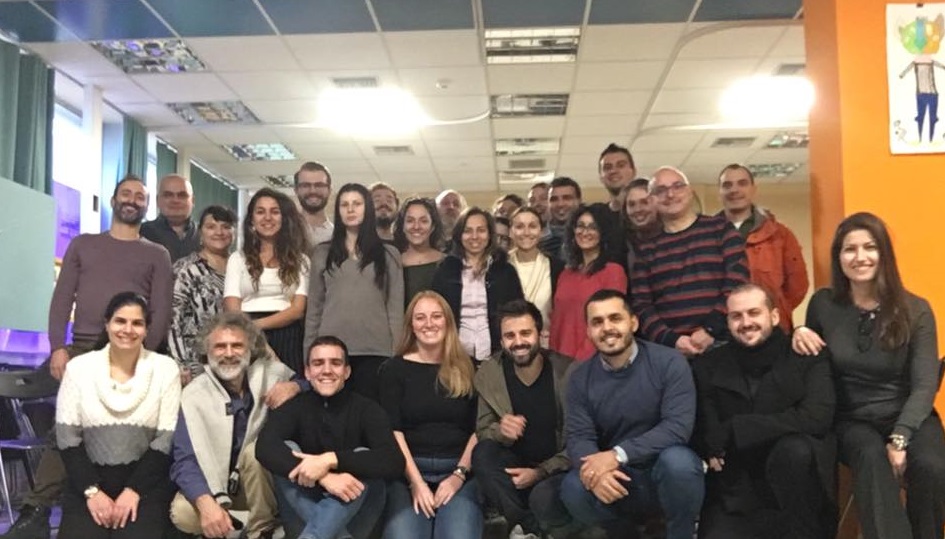
Working with youth requires the capacity to absorb, adjust and explore. For this reason, Inter Alia’s strategy puts in play its existing know-how and builds on previous projects while attempting to introduce new viewpoints, notions and methods.
Effective partnerships make our three, ambitious yearly plans, attainable. Complementarity of approaches and fields of expertise was a central factor for the selection of network members. Broad geographic coverage in line with the respective social needs and the capacity of partners to mobilize local communities, experts and stakeholders, were equally significant. Most partnerships build on existing initiatives while new ones will be added as we go, based on partners’ profile that fit to the priorities of the network and could offer fresh inputs that diversify its impact.
Along with network members we have agreed upon cooperation and decision making mechanisms. Besides, the network shall organise capacity building activities for its members and jointly plan activities for different interested groups in partner communities (youngsters, organizations, public authorities, experts and youth workers).
Regular consultation with target groups constitutes a central feature of the strategy. Partner organizations shall work with local communities to specify and prioritize social challenges and tackle them through feasible actions. The activities foreseen by Inter Alia’s strategy, address four multi-dimensional, interconnected themes: education, political engagement, research and cultural awareness. Depending on the primary thematic area, network members shall decide upon a specific set of activities based on local needs. Besides, through diverse monitoring and evaluation activities (partner meetings, group reflection, questionnaires) trustful relationships within the network and the respective target groups shall be established thus maximizing the impact of the strategy and the yearly plans.
Stakeholder analysis is an important preparatory step for all planned activities. We primarily aim at stakeholders with high influence among target groups in the sense of high power and high interest in our cause. Also, the plan includes parties that currently hold low power but have significant dynamics in their fields and could grow through participation in planned activities. Different groups are targeted by different activities. Yet, there is an underlying emphasis placed on the role of youth professionals due to its significance for supporting the youth navigate their way out of the current predicament in a cohesive and sustainable manner.
The strategy opts for diversity and foresees quality actions regardless of scale. It includes actions taking place at local level and remote areas, to regional, to European and global. In this way, beyond their specific aims, the projects will contribute to the diversification of networks, partnerships and stakeholders at all levels. Funding will be sought by different sources and sectors in order to remain able to set our own agenda and pursue our vision for Europe with as little external intervention as possible.
Statutory Meetings, Athens 7-9 December 2018 LINK
Presentations of partner organisations (regularly updated) LINK
Work Plan 2018 – Presentation LINK
Summary of Inter Alia’s Work Plan for 2019
2019-03-15
The role and impact of civil society, particularly in the youth field, has significantly increased after the eruption of multiple European crises and their economic, social and political effects on youth (unemployment, marginalisation, radicalisation). In this framework of significant potentials and increased responsibility, Inter Alia’s work plan 2019 aims to: a. Enhance youth engagement and empowerment through democratic education, civic participation and sense of initiative in view of the EP elections 2019;b. Enable intercultural exchange;c. Foster mobility and volunteerism;d. Promote the work of youth organisations and the co-existence of formal and non-formal education.
Methods & ActivitiesThe work-plan capitalises on the diversity of Inter Alia’s partnerships and expertise. The network combines non-formal learning methods and scholarly knowhow for dealing with contemporary challenges of youth. By enabling cooperation among network members, the work plan will: a. exchange and up-scale existing ideas and projects and open them to bigger audience and more target groups and b. develop new projects and initiatives that will be elaborated on the EU level but be primarily applied on the local level.The work plan focuses on education, political engagement, research and cultural awareness. Some of the subfields tackled are: active citizenship, civic education, youth work, sustainability, cultural exchange and volunteerism. The methods used in the civic and educational activities are peer-learning and learning-by-doing. With regards to scholarly activities, IA and its partners will organize conferences, focus groups, on-line surveys, policy-making debates and structured dialogue.Partnerships
The network involves 60 partners (organisations, educational, municipalities) from 24 countries. The organisations and educational institutions will introduce results to its youth. The networks will promote the visibility of activities and recruit partners. The municipalities will channel results into policy making and inform citizens about them.Expected Results
Target GroupsEuropean youngsters; Youth workers & educators; Civic and youth organizations; High-school and university students; Policy-makers; Scholars.Deliverables-Modules on media literacy, democratic education, community development;-Short-films created by youngsters (15);-Policy recommendations on youth policies, media literacy, democratic education in schools (3)-E-platform about youth participation;-Videos on Europeans who can inspire youth (4);-Performances using theatre as a tool for political engagement (6);-Awareness campaigns on fake news and participation in EP elections (2);-Festivals aimed to empower young artists (2).
FundingApart from EU funding, IA will continue cooperating with private and public international organizations, local and national authorities and donors.
To learn more or to express your interest for becoming a member of the network, please contact Boyka Boneva at boneva@interaliaproject.com





